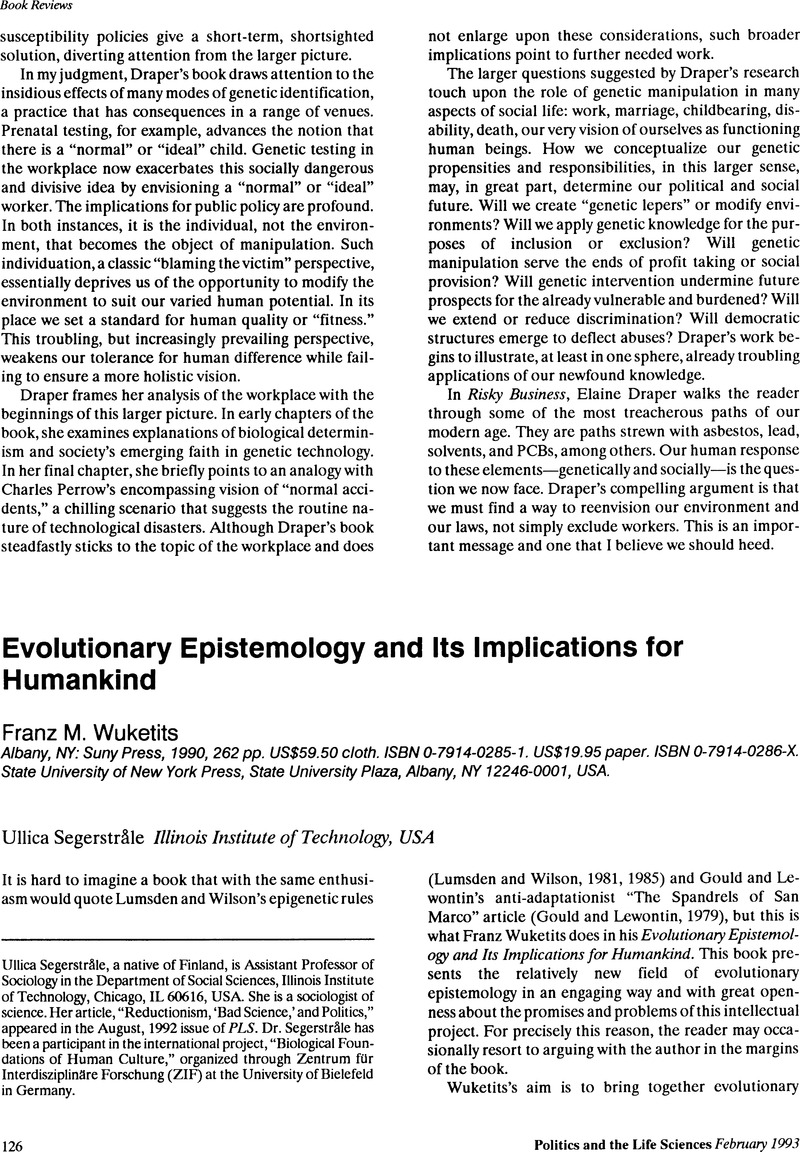No CrossRef data available.
Article contents
Evolutionary Epistemology and Its Implications for Humankind - Franz M. Wuketits, Albany, NY:Suny Press,1990, 262 pp. US$59.50 cloth. ISBN 0-7914-0285-1. US$19.95 paper. ISBN 0-7914-0286-X. State University of New York Press, State University Plaza, Albany, NY 12246-0001, USA.
Published online by Cambridge University Press: 17 May 2016
Abstract
An abstract is not available for this content so a preview has been provided. Please use the Get access link above for information on how to access this content.

- Type
- Book Reviews
- Information
- Copyright
- Copyright © Association for Politics and the Life Sciences
References
Boyd, R. and Richerson, P. (1985). Culture and the Evolutionary Process. Chicago: University of Chicago Press.Google Scholar
Campbell, D. (1974). “Evolutionary Epistemology.” In Schlick, P.A. (ed.), The Philosophy of Karl Popper. LaSalle, IL: Open Court.Google Scholar
Cosmides, L. and Tooby, J. (1987). “From Evolution to Behavior: Evolutionary Psychology as the Missing Link.” In Dupre, J. (ed.), The Latest on the Best: Essays on Evolution and Optimality. Cambridge, MA: MIT Press.Google Scholar
Durham, W. (1979). “Toward a Coevolutionary Theory of Human Biology and Culture.” In Chagnon, N. and Irons, W. (eds.), Evolutionary Biology and Human Social Behavior: An Anthropological Perspective. North Scituate, MA: Duxbury Press.Google Scholar
Durham, W. (1982). “Interaction of Genetic and Cultural Evolution: Models and Examples.” Human Ecology 10:289–323.Google Scholar
Durham, W. (1990). Coevolution: Genes, Culture and Human Diversity. Stanford, CA: Stanford University Press.Google Scholar
Gould, S. and Lewontin, R. (1979). “The Spandrels of San Marco and the Panglossian Paradigm: A Critique of the Adaptationist Programme.” Proceedings of the Royal Society of London, Series B, 205:581–98. Reprinted inSober, E. (ed.) (1984), Conceptual Issues in Evolutionary Biology. Cambridge, MA: Harvard University Press.Google Scholar
Lumsden, C. and Wilson, E. (1981). Genes, Mind and Culture. Cambridge, MA: Harvard University Press.Google Scholar
Lumsden, C. and Wilson, E. (1985). “The Relation between Biological and Cultural Evolution.” Journal of Social and Biological Structures 8:343–59.CrossRefGoogle Scholar
Maturana, H. and Varela, F. (1980). Autopoesis and Cognition. Dordrecht, Holland: Riedel.CrossRefGoogle Scholar
Riedl, R. (1977). “A Systems-Analytical Approach to Macro-Evolutionary Phenomena.” Quarterly Review of Biology 52:351–70.Google Scholar
Ruse, M. (1985). “Evolutionary Epistemology: Can Sociobiology Help?” In Fetzer, J. (ed.), Sociobiology and Epistemology. Dordrecht, Holland: Reidel.Google Scholar
Segerstråle, U. (1986). “Colleagues in Conflict: An In Vivo Analysis of the Sociobiology Controversy.” Biology and Philosophy 1:53–87.Google Scholar
Segerstråle, U. (1992). “Reductionism, ‘Bad Science,’ and Politics: A Critique of Anti-Reductionist Reasoning.” Politics and the Life Sciences 11:199–214.CrossRefGoogle Scholar
Tooby, J. and Cosmides, L. (1990). “The Past Explains the Present: Emotional Adaptations and the Structure of Ancestral Environments.” Ethology and Sociobiology 11:375–424.Google Scholar
Tversky, A. and Kahneman, D. (1974). “Judgment under Uncertainty: Heuristics and Biases.” Science 185:1124–31.Google Scholar




